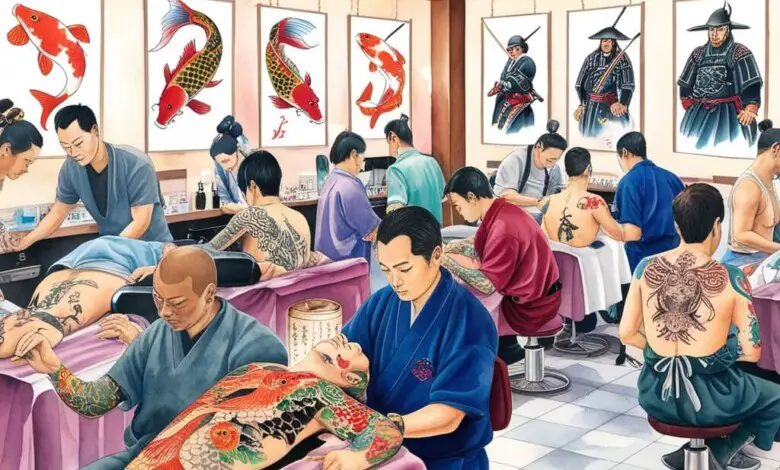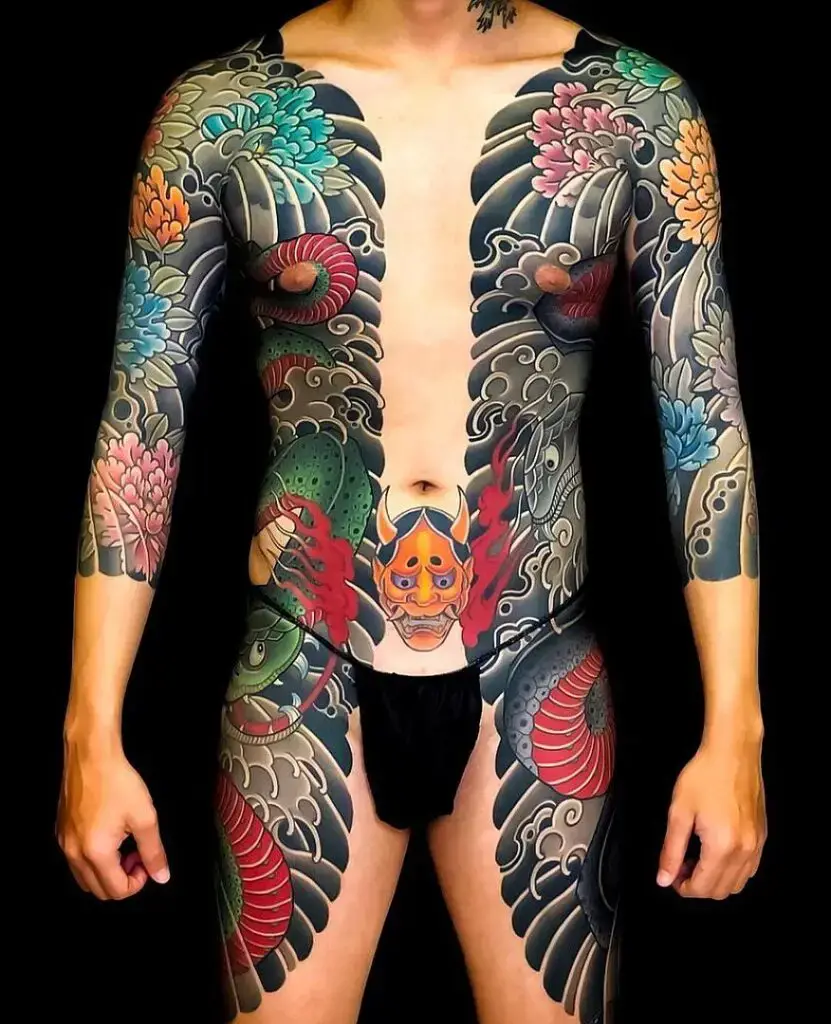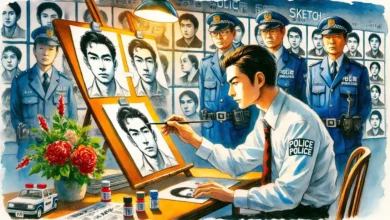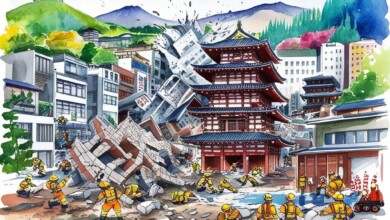Are Tattoos Allowed in Japan?

Tattoos are a way for people to express themselves and show their artistic side in many cultures. But in Japan, people think about tattoos in a special way. In this article, we’ll answer the question, “Are tattoos allowed in Japan?” We’ll look at what people in Japan thought about tattoos in the past and what they think now.
Historical Context of Tattoos in Japan
Early History of Tattoos in Japan
In Japan, tattoos, also known as “irezumi,” have a long and rich history that goes back to the Jomon period, from 10,000 BCE to 300 BCE.
Long ago, tattoos were more than just decorations. They had special meanings and were seen as lucky charms that protected the person who had them. People believed the detailed designs could scare off bad spirits and bring good luck, like a magical shield.
This early use of tattoos as symbols of protection shows how important “irezumi” is in Japanese culture. It gives us a cool look into how tattooing started in Japan. This was at a time when tattoos were respected for their spiritual power. It was long before they were linked with crime and rebellion. Understanding this history helps us understand how feelings about tattoos in Japan have changed over time.
Tattoos in Japanese Culture During the Edo Period
During the Edo period, from 1603 to 1868, tattooing in Japan changed a lot.
Tattoos, or “irezumi,” went from simple good luck charms to a detailed art form. Artists started making detailed designs that covered a lot of the body, turning skin into a kind of living painting. These designs often showed things from nature, myths, or old Japanese stories, showing the rich culture of the time.
But during this time, people also started thinking differently about tattoos. They started to be linked with crime and used as a punishment. Criminals were often forced to get tattoos to mark them as outsiders, always showing their wrongdoings on their skin.
This double change of tattoos was key. They were both an art and a sign of crime during the Edo period. This shaped how people think about tattoos in Japan today.
The Association of Tattoos with Yakuza
The link between tattoos, or “irezumi,” and the Yakuza, Japan’s famous crime groups, has made people think badly about tattoos in Japan.
These crime groups started using full-body tattoos as a strong sign of loyalty and power. The detailed designs, often covering the whole body from neck to ankle, became a symbol of honor and dedication in the crime world.
But this link had a big effect on what people think. Seeing these big tattoos became a sign of crime and not following society’s rules. This link between tattoos and the Yakuza has made people think badly of tattoos. But, they’re a big part of Japan’s culture and art. This link still affects how people feel about tattoos. More people worldwide now see them as a way to express themselves and as art.

Modern Perception of Tattoos in Japan
Tattoos and Japanese Societal Norms
In Japan today, many people are suspicious of tattoos, or “irezumi”. This often leads to them being left out.
Even though tattoos are becoming more popular worldwide, many in Japan still see them differently. They often view tattoos as a sign of rebellion, going against the usual rules in Japanese culture.
Because of this, people with tattoos can feel left out. They might have trouble finding jobs or not be allowed in places like gyms and hot springs. This is because tattoos are often linked with crime and defiance, a belief that has been around for a long time.
So, it’s important to understand this if you’re dealing with the rules and views about tattoos in Japan today.
The Influence of Western Culture on Japanese Tattoo Perceptions
Changes are starting to happen in Japan. Western influences, like media and tourists, are changing how people see tattoos, or “irezumi”.
These influences are making people see tattoos in a new way. They’re challenging the old idea that tattoos are linked to crime and rebellion. Things like popular culture, movies, music, and tourists with tattoos are showing that tattoos can be art and a way to express yourself.
This change is especially clear among young people in Japan. They’re more open to tattoos, seeing them as a cool way to show who they are, not as a sign of bad behavior. This change in how people see tattoos could mean a big shift in Japanese culture.
Overview of Japanese Laws Regarding Tattoos
Tattoos aren’t illegal in Japan, but there are strict rules about them. The Ministry of Health, Labour and Welfare in Japan makes these rules.
This group has made a rule that only doctors can give tattoos. This rule is there to keep people safe and make sure tattoos are clean.
But, this rule has caused a lot of arguments in Japan’s tattoo world. Many people say it limits their art and is hard on tattoo artists who aren’t doctors. This argument has led to many court cases. It shows the struggle between rules and freedom in Japanese tattooing. This argument is still changing how people see tattoos in Japan.
Regulations for Tattoo Artists in Japan
Some of these artists have medical licenses. This follows the strict rules made by Japan’s Ministry of Health, Labour and Welfare. It lets them do their art legally and makes their work more accepted.
But, many tattoo artists don’t have this official approval. These artists love their art so much, they choose to work even if it’s not fully legal. This choice lets them keep doing their art, but it also makes their life uncertain and risky.
Because they’re not officially approved, these artists often face legal problems. They’re always worried about getting in trouble with the law. This makes things tense and unstable for tattoo artists in Japan. It shows the difficult relationship between the people who make the rules and the tattoo artists in Japan.
Tattoo Policies in Public Spaces
In Japan, places like gyms, pools, and hot springs, called “onsen,” often have strict no-tattoo rules.
These rules come from the long-time link between tattoos, or “irezumi,” and the Yakuza, Japan’s famous crime groups. Seeing tattoos, especially big ones, can make people think of crime and rebellion. That can make others uncomfortable.
Also, these places want to be family-friendly. They want to be a place where people of all ages can relax and have fun without feeling scared or uneasy. The no-tattoo rule helps keep this friendly feeling, following society’s usual rules.
So, even though how people see tattoos in Japan is changing, the old ideas about them still affect rules in public places. This shows the tricky balance between old traditions and new ideas in Japan.

Tattoos in Japanese Work Culture
Corporate Policies on Tattoos
In Japan’s business world, having tattoos, or “irezumi,” can be a big problem. Many companies have strict rules against employees having visible tattoos.
These rules come from Japan’s traditional values of fitting in and working together, which are very important at work. Tattoos, which are often linked to rebellion and crime, are seen as breaking these values.
Workers who have tattoos are often expected to hide them during work. This could mean wearing clothes that cover the tattoos or using makeup to hide them. In some cases, companies might even ask workers to get their tattoos removed.
These company rules show that old ideas about tattoos in Japan are still strong, even though how people see tattoos is changing worldwide. They highlight the problems that people with tattoos face in Japan’s business world.
Job Prospects for Individuals with Tattoos
Having tattoos can really affect your chances of getting a job in Japan, especially in certain areas.
In more traditional fields like finance, law, and government, having tattoos can limit your job options. These areas often stick to old-fashioned rules, and visible tattoos can be seen as breaking these rules. So, people with tattoos might have a hard time getting jobs or moving up in their careers in these areas.
But, in more modern and creative fields like fashion, entertainment, and technology, tattoos are more accepted. These areas value being unique and creative, and see tattoos as a way to show who you are, not as a sign of rebellion.
So, how tattoos affect your job chances in Japan can really depend on the field. This shows the different and changing views about tattoos in different parts of Japanese society.
Public Spaces and Tattoos
Onsen (Hot Springs) and Their Policies on Tattoos
Onsen, Japan’s traditional hot springs, are a beloved part of the country’s culture. They’re seen as a place to relax and feel better, where you can soak in warm water and forget about stress.
But, many onsen have strict rules against tattoos. This comes from old ideas in society that link tattoos, or “irezumi,” with crime and rebellion. These rules are there to keep the onsen calm and family-friendly, without anything that might make people uncomfortable.
However, this can be frustrating for locals and tourists who have tattoos. They’re not allowed to enjoy this important part of Japanese culture, which can feel unfair and excluding. This problem shows the ongoing struggle between old rules and changing views about tattoos in Japan today.
Gyms and Pools Regulations
Just like the traditional onsen, many gyms and pools in Japan also have strict no-tattoo rules.
These places, which people often visit for exercise and fun, have strict rules to make sure everyone feels comfortable. Visible tattoos, which are often linked to crime and rebellion, can make people feel uneasy.
To make sure people follow these rules, they’re often enforced strictly. People with tattoos have to hide them. This could mean covering the tattoos with bandages or wearing clothes that hide them.
While these rules aim to follow society’s usual rules and make everyone feel comfortable, they can be hard for people with tattoos, who have to deal with these rules while trying to exercise and have fun.
Public Transportation and Tattoo Visibility
In Japan, there are no official rules against showing tattoos, or “irezumi,” on public transportation. People with visible tattoos can ride buses, trains, and other public transport.
But, just because there are no rules against it doesn’t mean everyone is okay with it. Visible tattoos can often get unwanted attention from other passengers. This can range from quick looks to clear signs of discomfort, making the person with the tattoo feel uneasy.
This reaction is especially strong in rural areas of Japan, where old-fashioned views are more common. In these areas, the old idea that tattoos are linked to crime and rebellion is stronger. So, visible tattoos can get stronger reactions, showing the difference between the official rules and how people feel about tattoos in Japan.

Tourism and Tattoos
Advice for Tourists with Tattoos Visiting Japan
If you’re a tourist with tattoos planning to visit Japan, it’s important to understand how people there see tattoos.
Because of Japan’s unique history and society, people there often link tattoos with crime and rebellion. So, visible tattoos can sometimes make people uncomfortable or even keep you out of certain public places.
So, if you’re a tourist with tattoos, it’s a good idea to learn about the local rules and customs about tattoos before your visit. Understanding these cultural rules can help make your visit smoother and more respectful.
If you’re not sure if it’s okay to show your tattoos, it’s usually best to cover them up. This can help avoid any problems or misunderstandings, letting you fully enjoy your visit while respecting the culture of Japan.
Cultural Etiquette for Tattooed Visitors
Respecting Japanese culture is very important, especially for visitors. This includes understanding how people in Japan feel about tattoos.
Because tattoos are often linked to crime and rebellion in Japan, they can sometimes be seen in a negative way. This can lead to anything from slight discomfort to being kept out of certain public places. So, visitors with tattoos should be careful and considerate.
In places where showing tattoos might make people uncomfortable or upset, it’s a good idea to cover them up. This could mean wearing clothes that hide the tattoos or using bandages or makeup for smaller tattoos.
By doing this, visitors can be respectful and sensitive to Japanese culture, making sure they follow local customs. This not only makes their visit better, but also helps keep the peace that is very important in Japanese culture.
Resources for Finding Tattoo-Friendly Establishments
If you’re a visitor to Japan with tattoos, there are many resources to help you find places that are friendly and welcoming.
Lots of websites and travel guides are made just for tourists with tattoos. They often have lists of places that are okay with tattoos, from traditional hot springs, or “onsen,” to gyms and other public places.
These lists are carefully made, making sure the places listed are okay with visible tattoos. This can make visitors with tattoos feel more comfortable, letting them enjoy their visit without worrying about being left out or uncomfortable.
By using these resources, visitors with tattoos can plan their trip knowing they’ll be welcomed at the places they choose to visit. This can make their visit much better, letting them fully enjoy Japan’s rich culture and traditions.
Tattoos in Japanese Pop Culture
Representation of Tattoos in Japanese Media
How tattoos are shown in Japanese media is complex and shows how people in Japan feel about this type of body art.
In the past, tattoos were often linked to bad or villainous characters in movies, TV shows, and books. This showed the old idea of tattoos as signs of rebellion and crime, making people see them in a negative way.
But, things are starting to change, especially in manga and anime, which are known for their creativity and different themes. More and more, characters with tattoos are shown in a good way, often as the main characters or heroes. Their tattoos are shown as a way to express who they are, their strength, or special abilities, challenging the old negative ideas.
This growing trend of showing tattoos in a positive way could mean a change in how people in Japan see tattoos. It also shows how media can shape what people think is normal and acceptable.
Influence of Celebrities on Tattoo Trends
In Japan, famous people, especially in entertainment and sports, are changing how people see tattoos.
These celebrities, who many people look up to, are making tattoos more normal. They show off their tattoos, seeing them as a part of who they are and a way to express themselves. This challenges old ideas and tells a new story about tattoos, one that doesn’t link them to crime and rebellion.
These celebrities are changing more than just their fans’ views. Their acceptance and celebration of tattoos are slowly changing how everyone sees tattoos, making them more accepted by everyone.
Their influence is especially strong among young people. Inspired by their favorite celebrities, these young people are more open to tattoos, seeing them as a way to express themselves, not as a sign of bad behavior. This could mean a big change in how society in Japan understands and accepts tattoos.
Conclusion
How people in Japan see tattoos has changed a lot over time. Tattoos used to be seen as a sign of crime and rebellion, but now more people see them as a way to express themselves.
Even with this change, some places in Japan still have strict no-tattoo rules. These rules come from old ideas and history, showing the complicated feelings about tattoos in Japan.
But, more and more people are starting to see tattoos as art and a way to show who you are. This change is especially clear among young people and in more modern parts of society.
If you’re visiting Japan, it’s important to know and respect these local rules and customs. Understanding and respecting these cultural rules can make your visit to Japan much better. It lets you be respectful and enjoy your visit to this country with a rich culture.
FAQs
1. Can tourists with tattoos visit Japanese hot springs?
Many hot springs in Japan have strict no-tattoo policies, but some establishments are more lenient towards tourists. It’s advisable to inquire beforehand and respect the policies of each specific location.
2. Are tattoos widely accepted in Japanese society?
The acceptance of tattoos varies within Japanese society. While younger generations are more open to tattoos, some older generations may still hold negative views. Acceptance can also depend on the context and individual perspectives.
3. Are there any specific cultural or religious reasons for the negative perception of tattoos in Japan?
The negative perception of tattoos in Japan is primarily rooted in historical associations with criminal organizations. It is not directly linked to cultural or religious reasons.
4. Are there any exceptions to the no-tattoo policies in public spaces?
Some public spaces may be more accepting of tattoos, especially in larger cities or areas with a strong tattoo subculture. However, it is advisable to be respectful and cover tattoos in spaces where they may be deemed inappropriate.
5. Are there any alternative ways for individuals with tattoos to enjoy hot springs in Japan?
Some hot springs offer private bathing facilities or designated tattoo-friendly days to accommodate individuals with tattoos. It’s recommended to research and inquire about such options beforehand.




